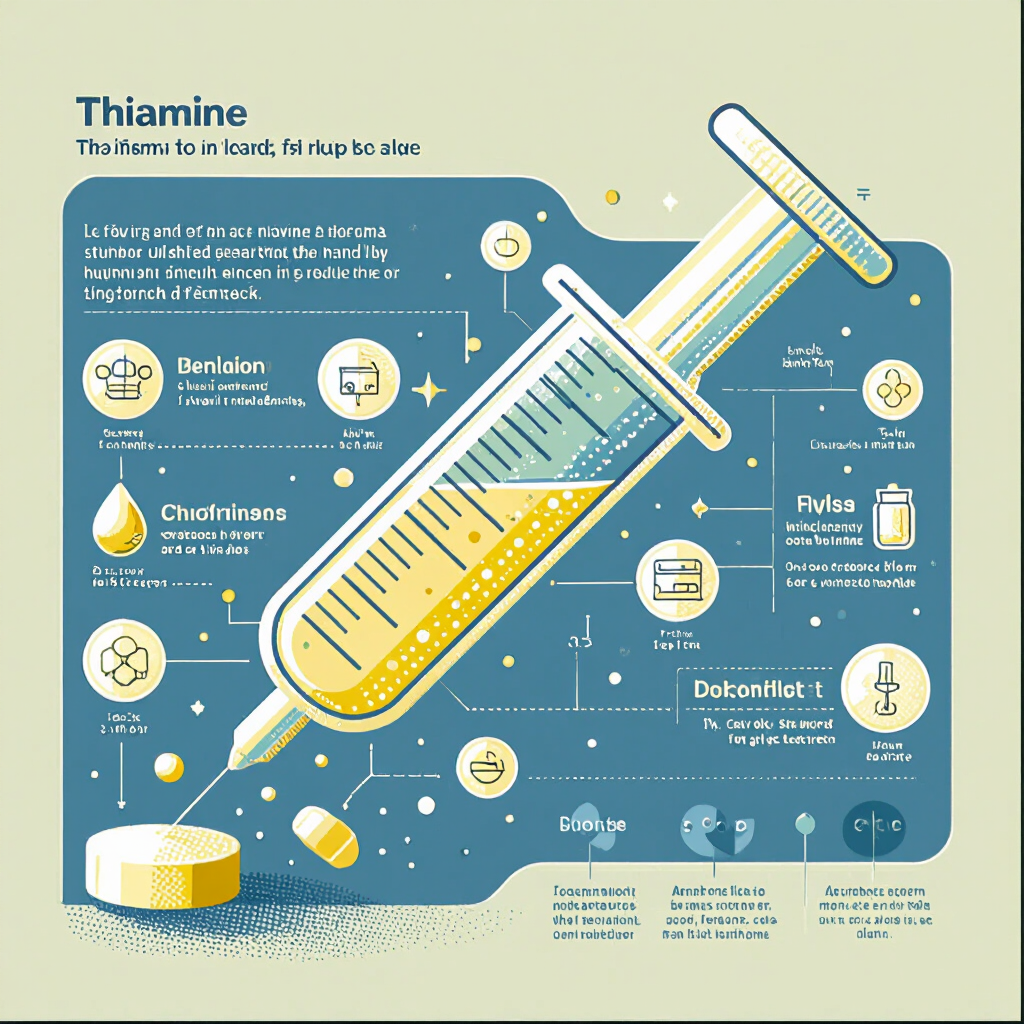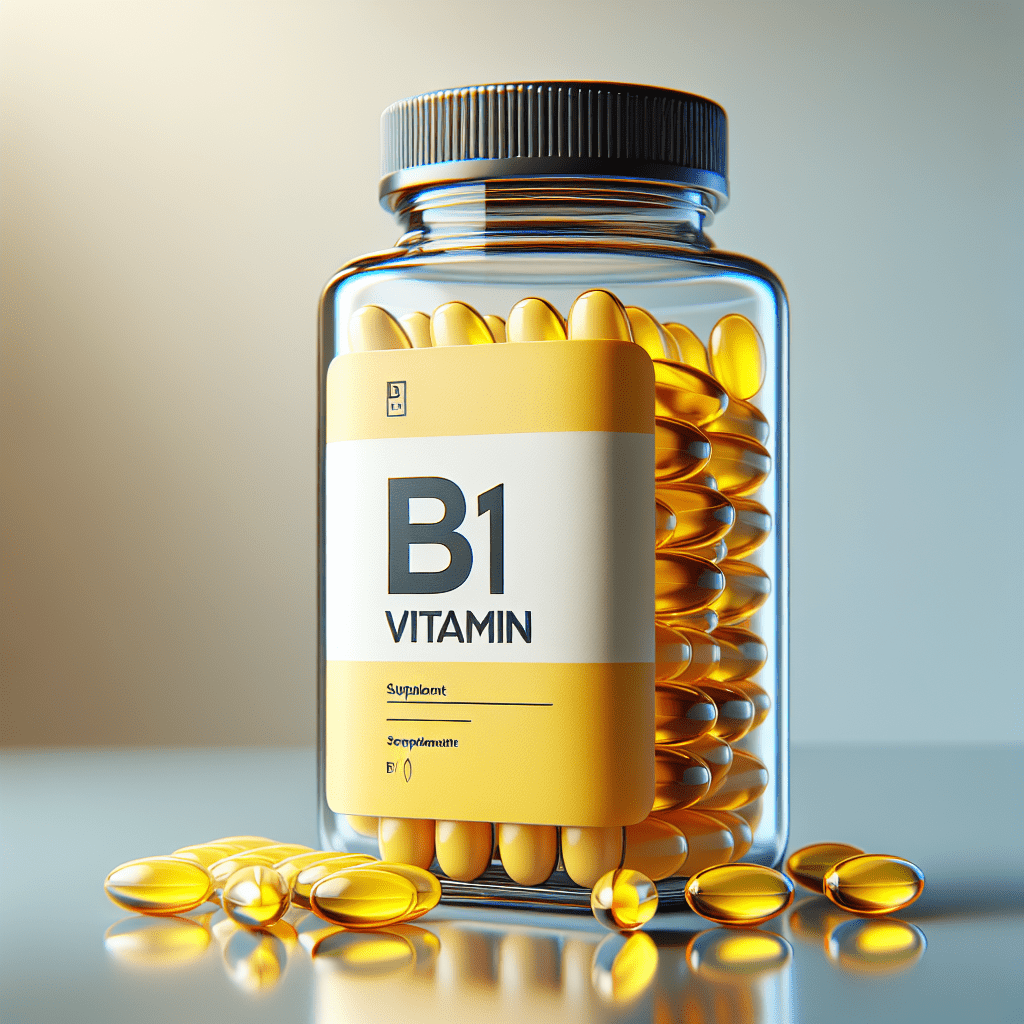B1 Shots: A Potential Aid in Treating Alzheimer's Disease

Alzheimer's disease is a progressive neurological disorder that profoundly affects memory, thinking, and behavior. As one of the most common causes of dementia, it poses significant challenges not only to those diagnosed but also to their families and caregivers. The gradual decline in cognitive health can disrupt daily life, making even simple tasks difficult and diminishing quality of life over time. Despite extensive research, effective treatments that can halt or reverse the progression of Alzheimer's remain limited, prompting ongoing exploration into alternative and supportive therapies.
Vitamin B1, also known as thiamine, plays a crucial role in brain function by supporting energy metabolism and nerve health. Deficiency in this essential nutrient has been linked to neurological problems, including memory impairment and cognitive decline. B1 shots, or vitamin B1 injections, are commonly used to quickly restore thiamine levels in individuals with deficiencies, offering a more direct and efficient method than oral supplements. These injectable vitamin B1 treatments have traditionally been employed to address conditions like beriberi and Wernicke Korsakoff syndrome, but their potential benefits may extend further.
Recent studies have begun to investigate the relationship between thiamine levels and Alzheimer's disease, suggesting that B1 shots could play a role in supporting cognitive function in affected patients. Some research indicates that thiamine deficiency may exacerbate the symptoms of Alzheimer's, and replenishing this vitamin through B1 injections might help improve memory and mental clarity. While more extensive clinical trials are needed to confirm these findings, the emerging evidence offers hope for a complementary approach to managing this complex condition.
For those interested in learning more about the use of B1 shots and their potential benefits, detailed information is available on the b12-shot.com page. Understanding how vitamin B1 supports brain health and exploring its therapeutic applications could open new avenues for enhancing the quality of life for individuals living with Alzheimer's disease.

Understanding Vitamin B1 and Its Role in Brain Health
The biological function of vitamin B1 in the nervous system
Vitamin B1, commonly known as thiamine, is an essential nutrient that plays a vital role in maintaining the health and function of the nervous system. One of its primary biological functions is facilitating the conversion of nutrients into energy, a process critical for brain cells. The brain is an energy intensive organ, consuming approximately 20% of the body's total energy despite representing only about 2% of body weight. Thiamine acts as a coenzyme in carbohydrate metabolism, helping convert glucose into adenosine triphosphate (ATP), the energy currency that powers cellular activities. Without adequate thiamine, brain cells cannot efficiently generate the energy needed to sustain their complex functions.
Beyond energy production, vitamin B1 is crucial for nerve signal transmission. It supports the synthesis of neurotransmitters, the chemical messengers that allow neurons to communicate. Proper nerve signaling is essential for cognitive processes such as memory, attention, and learning. Thiamine also contributes to the maintenance of the myelin sheath, the protective covering around nerves that ensures rapid and accurate transmission of electrical impulses. Damage to this sheath can lead to neurological symptoms, highlighting the importance of sufficient thiamine levels.
Another critical role of vitamin B1 is the prevention of neurological damage caused by deficiency. When thiamine levels drop, the brain becomes vulnerable to oxidative stress and inflammation, which can accelerate neuronal injury. This is particularly relevant in conditions like Alzheimer's disease, where neurodegeneration is a hallmark. Thiamine deficiency can lead to Wernicke’s encephalopathy, a severe neurological disorder characterized by confusion, memory loss, and impaired coordination. This underscores the protective role of vitamin B1 in maintaining brain integrity and function.
Common causes and effects of vitamin B1 deficiency in adults
Vitamin B1 deficiency can arise from several causes, many of which are related to dietary insufficiency and malabsorption issues. Inadequate intake of thiamine rich foods such as whole grains, legumes, nuts, and meat can lead to deficiency, especially in populations with limited access to a balanced diet. Additionally, certain medical conditions impair the absorption of thiamine in the gastrointestinal tract. Chronic alcoholism is a well known risk factor, as it interferes with both the absorption and utilization of vitamin B1. Other causes include gastrointestinal surgeries, prolonged vomiting, and certain medications that affect nutrient absorption.
The effects of vitamin B1 deficiency extend beyond physical symptoms and often manifest as cognitive decline and memory loss. Early signs may include fatigue, irritability, and difficulty concentrating, which can be mistaken for normal aging or stress. As deficiency progresses, more severe neurological symptoms can develop, such as confusion, impaired short term memory, and difficulty with coordination. These symptoms overlap with those seen in neurodegenerative diseases, making it important to consider thiamine status in patients presenting with cognitive impairment.
Aging populations and individuals with chronic illnesses are at increased risk for vitamin B1 deficiency. Older adults often experience reduced dietary intake and absorption efficiency, compounded by the presence of multiple health conditions and medications. Chronic diseases such as diabetes and kidney failure can also affect thiamine metabolism, further increasing vulnerability. Recognizing and addressing vitamin B1 deficiency in these groups is critical to preventing further cognitive deterioration and supporting overall brain health.
How B1 shots provide an effective method to restore adequate vitamin levels
B1 shots, or vitamin B1 injections, offer a highly effective method to restore adequate thiamine levels, especially in cases where oral supplementation may be insufficient. One of the key advantages of injectable vitamin B1 is its faster absorption compared to oral supplements. When taken orally, thiamine must pass through the digestive system, where absorption can be limited by factors such as gastrointestinal health and interactions with other nutrients or medications. In contrast, vitamin B1 injection delivers the nutrient directly into the bloodstream, bypassing the digestive tract and ensuring rapid availability.
Higher bioavailability is another important benefit of B1 shots. Because the vitamin reaches the bloodstream immediately, it can cross the blood brain barrier more efficiently, allowing the brain to quickly access the thiamine it needs. This is particularly valuable in neurological conditions where timely restoration of vitamin levels can help mitigate symptoms and support cognitive function. Injectable vitamin B1 is often used in clinical settings to treat severe thiamine deficiency and related neurological disorders, demonstrating its effectiveness and reliability.
In terms of safety, B1 shots have a well established profile when administered correctly. Common administration practices involve intramuscular or intravenous injections, typically performed by healthcare professionals. Side effects are generally rare and mild, with occasional reports of localized pain or irritation at the injection site. Because thiamine is a water soluble vitamin, excess amounts are usually excreted in urine, reducing the risk of toxicity. However, it is important to follow recommended thiamine shot dosage guidelines to ensure optimal outcomes and minimize any potential risks.
Overall, B1 vitamin injections represent a valuable tool in addressing vitamin B1 deficiency, particularly in individuals with absorption challenges or increased nutritional needs. Their ability to quickly restore thiamine levels and support brain health makes them a promising option in the broader context of cognitive care and neurological support.

The Connection Between B1 Deficiency and Alzheimer's Disease
Scientific evidence linking thiamine deficiency to neurodegenerative disorders
Emerging scientific research has increasingly highlighted a significant connection between thiamine deficiency and neurodegenerative disorders, particularly Alzheimer's disease. Multiple studies have documented that individuals diagnosed with Alzheimer's often exhibit lower levels of vitamin B1 compared to healthy counterparts. This deficiency is not merely coincidental but appears to play a role in the progression and severity of cognitive decline associated with the disease.
One of the critical ways thiamine deficiency impacts Alzheimer's patients is through its effect on brain glucose metabolism. The brain relies heavily on glucose as its primary energy source, and thiamine is essential for the enzymatic processes that convert glucose into usable energy within brain cells. When thiamine levels are insufficient, this metabolic pathway becomes impaired, leading to reduced energy production. This energy deficit can contribute to neuronal dysfunction and death, exacerbating the cognitive symptoms characteristic of Alzheimer's disease.
Moreover, research has found a correlation between the severity of thiamine deficiency and the intensity of cognitive symptoms. Patients with more pronounced vitamin B1 deficiency tend to experience greater memory loss, confusion, and difficulties with executive functions. These findings suggest that thiamine status may not only influence the risk of developing Alzheimer's but also affect the disease’s progression and symptom severity. Understanding this relationship is crucial for developing targeted interventions that address nutritional deficiencies as part of comprehensive Alzheimer's care.
Potential mechanisms by which B1 supplementation might slow or reverse cognitive decline
Vitamin B1 supplementation, particularly through vitamin B1 injection, offers several potential mechanisms that could help slow or even reverse cognitive decline in Alzheimer's patients. One of the primary benefits is the enhancement of mitochondrial energy production in brain cells. Mitochondria, often referred to as the powerhouses of the cell, require thiamine dependent enzymes to efficiently generate ATP. By restoring adequate thiamine levels, B1 shots can improve mitochondrial function, thereby increasing the energy available to neurons and supporting their survival and activity.
In addition to boosting energy metabolism, thiamine supplementation may reduce oxidative stress and inflammation in the brain. Oxidative stress results from an imbalance between free radicals and antioxidants, leading to cellular damage. Chronic inflammation is also a hallmark of Alzheimer's pathology, contributing to neuronal injury and cognitive decline. Thiamine has antioxidant properties and can modulate inflammatory responses, potentially protecting brain cells from further damage and slowing disease progression.
Another important mechanism involves the support of neurotransmitter synthesis and overall cognitive function. Thiamine is necessary for the production of acetylcholine, a neurotransmitter closely linked to memory and learning. Alzheimer's disease is characterized by a decline in acetylcholine levels, which contributes to cognitive deficits. By ensuring sufficient thiamine availability, B1 vitamin supplements may help maintain neurotransmitter balance and improve cognitive performance.
Case studies and clinical trials investigating B1 shots' effects on Alzheimer's symptoms
Several case studies and clinical trials have explored the effects of B1 shots on Alzheimer's symptoms, providing promising but preliminary evidence of their potential benefits. Some research has reported improvements in memory, attention, and daily functioning following vitamin B1 injection therapy. For example, patients receiving regular thiamine shots showed enhanced cognitive test scores and reported better quality of life compared to those who did not receive supplementation.
These studies often highlight the thiamine shot benefits in terms of rapid absorption and effective delivery to the brain, which may explain the observed improvements. However, it is important to note that many of these trials have limitations, including small sample sizes, short durations, and variability in thiamine injection dosage. Consequently, while the initial findings are encouraging, larger and more rigorous clinical trials are necessary to establish definitive conclusions about the efficacy of B1 shots in treating Alzheimer's disease.
Despite these limitations, the growing body of evidence supports the inclusion of thiamine deficiency treatment as part of a multifaceted approach to managing Alzheimer's. Ongoing research continues to investigate optimal thiamine injection dosage, frequency, and long term effects, aiming to refine treatment protocols and maximize patient outcomes. As understanding deepens, injectable vitamin B1 may become a valuable adjunct therapy in the fight against cognitive decline.

Practical Considerations and Future Directions
Who might benefit most from B1 shot treatment in the context of Alzheimer's
Vitamin B1 injection therapy holds particular promise for certain groups of individuals affected by Alzheimer's disease. Patients with confirmed vitamin B1 deficiency are the most obvious candidates for B1 shots, as restoring adequate thiamine levels can directly address the neurological impairments caused by this deficiency. Identifying these patients through blood tests and clinical evaluation is essential to ensure that thiamine supplementation is both necessary and effective. In such cases, injectable vitamin B1 can rapidly replenish depleted stores, potentially improving cognitive symptoms and overall brain function.
Individuals in the early stages of cognitive decline may also benefit from B1 shots. Early intervention is critical in neurodegenerative diseases, as it offers the best chance to slow progression and preserve quality of life. Since thiamine plays a key role in brain energy metabolism and neurotransmitter synthesis, supplementing with B1 vitamin supplements during the initial phases of Alzheimer's could help maintain neuronal health and delay further deterioration. This approach may be particularly valuable when combined with other therapeutic strategies aimed at supporting cognitive function.
Additionally, those seeking adjunct therapies to conventional Alzheimer's treatments might consider B1 shots as part of a comprehensive care plan. While current medications primarily focus on symptom management, vitamin B1 injection uses target underlying nutritional deficiencies that may exacerbate cognitive decline. Integrating thiamine supplementation with standard treatments could enhance overall outcomes by addressing multiple aspects of the disease. However, it is important for patients and caregivers to consult healthcare professionals before starting any new therapy to ensure safety and appropriateness.
Recommendations for incorporating B1 shots into a broader cognitive health plan
Incorporating B1 shots into a broader cognitive health plan requires careful medical supervision and accurate diagnosis. Healthcare providers should evaluate patients thoroughly to confirm vitamin B1 deficiency and rule out other potential causes of cognitive symptoms. This ensures that thiamine injection therapy is targeted and effective. Regular monitoring of vitamin levels and cognitive function is also important to assess treatment response and make necessary adjustments.
Combining B1 supplementation with a balanced diet, regular exercise, and prescribed medications can optimize cognitive health. A nutrient rich diet that includes thiamine containing foods supports ongoing brain function, while physical activity promotes blood flow and neuroplasticity. Medications prescribed for Alzheimer's may work synergistically with vitamin B1 injections to manage symptoms and improve quality of life. This holistic approach recognizes that no single treatment is sufficient on its own and emphasizes the importance of lifestyle factors in cognitive care.
Monitoring and adjusting treatment based on patient response is crucial for maximizing benefits and minimizing potential risks. Thiamine injection dosage should be tailored to individual needs, considering factors such as age, severity of deficiency, and overall health status. Healthcare providers should watch for any B1 injection side effects, although these are generally rare and mild. Open communication between patients, caregivers, and medical professionals helps ensure that the treatment plan remains effective and safe over time.
Research outlook and ongoing developments in vitamin based neurological therapies
The future of vitamin based neurological therapies, including the use of B1 shots, is marked by exciting innovations and growing scientific interest. Researchers are exploring new delivery methods to improve the efficiency and convenience of thiamine supplementation. For example, advancements in injectable vitamin B1 formulations aim to optimize absorption and prolong the duration of therapeutic effects, potentially reducing the frequency of injections needed.
Personalized medicine approaches are also gaining traction in this field. By analyzing genetic, metabolic, and lifestyle factors, healthcare providers may soon be able to tailor thiamine shot dosage and treatment schedules to individual patients more precisely. This customization could enhance treatment efficacy and reduce the risk of side effects, making vitamin B1 injection therapy a more attractive option for a wider range of patients.
Moreover, there is increasing interest in multi nutrient combinations for cognitive support. Researchers are investigating how vitamin B1 injection benefits might be amplified when combined with other vitamins, minerals, and antioxidants known to support brain health. These synergistic therapies could offer a more comprehensive approach to managing Alzheimer's disease and other neurodegenerative conditions, addressing multiple pathways involved in cognitive decline.
As research continues to evolve, the role of thiamine and other vitamins in neurological health is becoming clearer. While more large scale clinical trials are needed to establish definitive guidelines, the current evidence supports the potential of B1 shots as a valuable component of cognitive care. Ongoing developments promise to refine and expand the use of vitamin based therapies, offering hope for improved outcomes in Alzheimer's disease and beyond.

Looking Ahead: The Role of B1 Shots in Alzheimer's Care
B1 shots represent a promising, though still emerging, option for supporting brain health in individuals affected by Alzheimer's disease. The unique role of vitamin B1 in energy metabolism, nerve function, and neurotransmitter synthesis makes it a critical nutrient for maintaining cognitive health. As research continues to uncover the links between thiamine deficiency and neurodegenerative disorders, injectable vitamin B1 has gained attention as a potential therapeutic tool. Its ability to rapidly restore thiamine levels and improve brain function offers hope for patients experiencing cognitive decline, especially those with confirmed vitamin B1 deficiency or in the early stages of Alzheimer's.
While B1 shots are not a standalone cure, they may serve as a valuable adjunct to existing treatment strategies. The benefits observed in clinical studies, including improved memory, enhanced daily functioning, and reduced neurological symptoms, highlight the potential impact of thiamine supplementation. Moreover, the safety profile and relatively low risk of side effects make injectable vitamin B1 an accessible option for many patients. However, it is important to approach this therapy with realistic expectations and under the guidance of healthcare professionals to ensure appropriate use and monitoring.
Continued research and individualized care are essential to fully understand and utilize B1 supplementation as part of dementia treatment strategies. Larger, well designed clinical trials are needed to establish optimal thiamine shot dosage, frequency, and long term effects on cognitive health. Additionally, exploring how B1 shots can be integrated with other nutritional, pharmacological, and lifestyle interventions will help create comprehensive care plans tailored to each patient’s unique needs.
Personalized approaches that consider genetic, metabolic, and environmental factors may enhance the effectiveness of vitamin B1 injection therapy and minimize potential risks. As the scientific community advances in understanding the complex mechanisms underlying Alzheimer's disease, vitamin based therapies like B1 shots could become an important component of multi faceted treatment regimens. This evolving landscape offers hope for improved quality of life and cognitive outcomes for those living with Alzheimer's and related dementias.
In summary, while B1 shots are still an emerging area of study, their potential to support brain health and cognitive function in Alzheimer's disease is encouraging. With ongoing research, careful clinical application, and a holistic approach to patient care, vitamin B1 injections may play a meaningful role in the future of dementia treatment.


